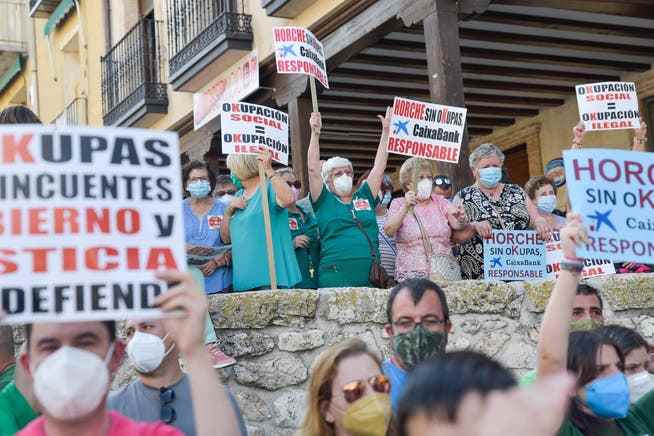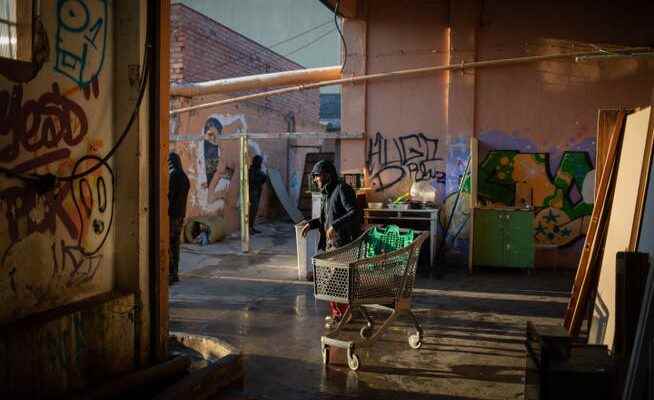Owners, on the other hand, are usually powerless for months. The government wants to change that with an amendment to the law. But this doesn’t completely solve the problem.
Around a hundred people have occupied this empty department store on a shopping street in Barcelona. However, the eviction of the property was repeatedly delayed because the squatting law leaves loopholes.
A nightmare begins for Javier del Pino at the end of May. One day, two men show up at the house of his 97-year-old mother-in-law Hortensia in the Madrid suburb of Colmenar Viejo and occupy the property. The elderly owner had recently moved to a retirement home; since then her son-in-law has taken care of the property.
He rushed to the house after neighbors alerted him. He can no longer enter the property because the lock at the entrance has already been replaced. Even the police won’t help him. “Officials told me this house was occupied and we were not allowed in anymore, not even to get laundry for my mother-in-law at the home,” Javier complained to a local TV station.
In fact, the hands of the Spanish law enforcement agencies have been tied in such cases so far. If the squatters, the so-called “okupas”, manage to remain in a hijacked accommodation for 48 hours without the owner noticing, they can only be expelled from the accommodation by court order.
Because the judiciary in Spain works extremely slowly, obtaining an order can take months or even years. Time in which Javier del Pino and his family still have to pay for the water and electricity consumption in the house. Because del Pino states that the police instructed him not to turn off the water and electricity because otherwise he would be liable to prosecution.
Anyone who owns a holiday property is also at risk
The problem of illegal squatting is well known in Spain. In recent years, however, the cases have increased. Last year, an average of 49 cases per day were reported, and the Spanish Ministry of the Interior counted around 17,300 reports at the end of the year.
It is not uncommon for owners of holiday homes in Northern Europe to be affected, who are unaware of what is happening to their second home as soon as they return home.
The squatting has now become a lucrative business. Organized gangs track down vacant houses and apartments, change the locks and rent the hijacked objects to third parties. Often, however, the owner is also blackmailed, and the intruders only move away after a “ransom” has been paid to them.
In addition to these mafia-like structures, there are also cases of social hardship where families have no means of renting an apartment and therefore move into vacant properties.
The pandemic has exacerbated the problem
Catalonia and the Balearic Islands, as well as the coastal towns of Murcia, Valencia and Andalusia are particularly badly affected by this practice. The situation also worsened during and after the pandemic because the socialist government of Prime Minister Pedro Sánchez had passed a law in early 2020 that prohibited any type of forced eviction for people who are socially disadvantaged and do not have their own accommodation. However, those who rent an apartment regularly but stop paying the rent after one month are also protected.
In some towns, neighbors are now on patrol around the clock, guarding vacant or unfinished blocks of flats. There are many of them in Spain, because after the financial crisis thousands upon thousands of unsaleable apartments went into the care of the banks. Even social housing is affected. A young woman from the Madrid suburb of Parla in the south of the metropolis complained to the daily newspaper “El Mundo” that in her building 18 apartments are occupied. She is the only one who lives there regularly and is threatened by the other residents so that she vacates her apartment.

Residents of Horche, a town about 80 kilometers east of the capital Madrid, are protesting against the many squatters who have settled in their neighborhood.
The Spanish government now wants to put a stop to this development with an amendment to the law. However, this is only intended to stop gang activities. Because the new law includes the possibility of express evictions within 48 hours for all properties whose residents cannot produce a title deed or rental agreement.
However, squatters who are demonstrably in a social emergency should still not be able to be thrown out the door. In these cases, the municipalities should rather find alternative accommodation. Unidas Podemos, the left-wing junior partner in Spain’s governing coalition, was able to push this through.
This is likely to delay the handover of the property to its rightful owner again. Lawyers like Maria Pastor vom College d’Advocats from the Catalan town of Mataró. The new regulation can stop squatting by delinquents, but not by people in financial distress, she told the Catalan daily La Vanguardia. This is especially the case when the social services and town halls have no solution for these people due to a lack of funds.
So the problem is likely to persist as only 2.5 percent of the total housing stock in Spain is social housing. The country is thus below the average for other EU countries.
Private clearance services are booming
Owners who do not want to wait for the courts to evict now turn to private eviction services such as Desocupa24horas or Desokupa Demolition. Javier del Pino also turned to the latter to get his mother-in-law’s house back. Angel, head of Desokupa Demolition, does not want to say over the phone how he went about driving the squatters out of the property. His company, which also includes lawyers, is always successful.
However, when Javier del Pino entered the house four months later, he couldn’t believe his eyes. It was neglected, the furniture destroyed, the bookshelves empty. Finally, he received a water bill of 2000 euros because the intruders had refilled the pool three times.
